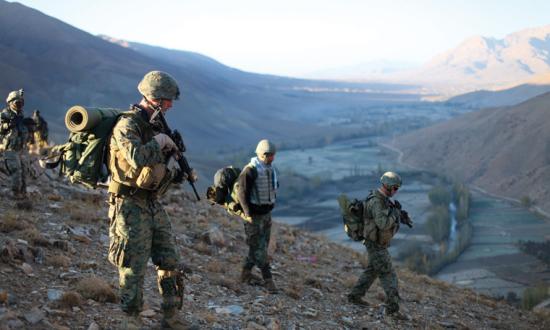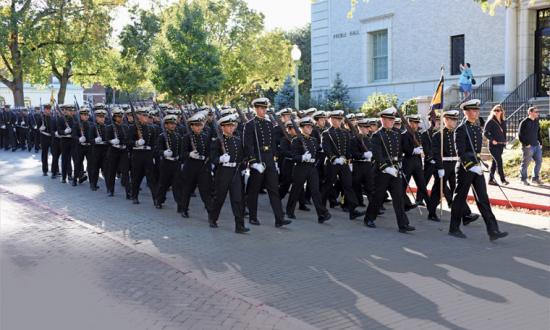At the U.S. Naval Academy, science, technology, engineering, and mathematics (STEM) is king and accounts for 20 of the 26 academic majors available to midshipmen. STEM departments garner the most funding from the Naval Academy, often reside in new or refurbished buildings, and are considered the most difficult and prestigious majors among midshipmen. None of this is wrong, per se. The heavy emphasis on STEM plays an important role in equipping future naval officers with the skills required for technologically sophisticated service communities, such as submarine warfare.
However, overall midshipmen development suffers when the focus on STEM subjects overwhelms education in the humanities. Great naval officers, from Rear Admiral Alfred Thayer Mahan and Vice Admiral William Sims to Vice Admiral James Stockdale and General Charles C. Krulak, taught that studying the humanities is the irreplaceable foundation for moral leadership and strategic discernment in naval officers. Naval officers must study history, immerse themselves in philosophy, and grapple with the great literature of the past, because to lead morally and think strategically requires the willingness and ability to wrestle with what it means to be human.
The concept of moral leadership comes primarily from Stockdale, who defined it as effective leadership under pressure while keeping “absolutely clean morally.” In his 1980 Proceedings article “Moral Leadership,” Stockdale made the claim that a thorough understanding of moral philosophy and literary classics—along with the rigorous application of moral principles to one’s own life—is the essential ingredient of genuine moral leadership, which to Stockdale meant leading effectively under immense moral and physical pressure.
Stockdale warned of the dangers of leaders ill-equipped to understand the historical and philosophical context in which they act. He argued that, for the latter half of the 20th century, “We’ve been surrounded by gamesmen unable to cope with the wisdom of the ages. They make exceptions to law and custom in favor of themselves because they chose to view ordinary dilemmas as unprecedented crises.” The antidote to such exception-making under duress, argued Stockdale, “is the assignment of enough hard-core philosophy . . . and the reading of enough high-quality ultimate situation literature . . . to deter self-pity when in extremis.” An education grounded in philosophy and the human experience as recorded in history and literature—what Stockdale deemed “the wisdom of the ages”—is the prerequisite for the moral leadership that is so essential for America’s naval officers.
To Stockdale, effective moral leadership meant leaders who “keep themselves absolutely clean morally . . . lead by example . . . [are] able to implant high-mindedness in their followers . . . have competence beyond status . . . [and] have earned their followers’ respect by demonstrating integrity.” All these vital attributes of moral leadership must come, according to Stockdale, from internalizing moral philosophy and engaging with the classics. In the naval profession, knowledge of morality is not enough. Officers must make that code of ethics their own and apply its principles to their professional lives—an impossible task without a system of education that equips future naval officers to be moral leaders through the study of the humanities.
As Stockdale testified, “I am just as firmly convinced that education in the classics and in the principles of human relationships gave me far better preparation for being a prisoner of war than did the traditional survival and evasion training.” The Naval Academy today equips midshipmen for leadership in the fleet with three required leadership and ethics courses. However, Stockdale’s experience demonstrates that those leadership lessons cannot truly take root in midshipmen without the humanities. Midshipmen must be able to wrestle with what it means to be a moral leader in the context of the human experience that only the humanities can provide. Stockdale expounded on the vital importance of a leader educated in philosophy, history, and the classics:
A properly educated leader, especially when harassed and under pressure, will know from his study of history and the classics that circumstances very much like those he is encountering have occurred from time to time on this earth since the beginning of history. He will avoid the self-indulgent error of seeing himself in a predicament so unprecedented, so unique, as to justify his making an exception to law, custom, or morality in favor of himself.
Moral leadership requires an understanding of context and the ability to make decisions based on enduring principles rather than temporary pressures.
Timeless Truths in a Technical World
Some today argue that the Navy of the 21st century runs more on 1s and 0s than on philosophers and poets—that a thorough education in the humanities is no longer necessary for naval officers given the increasingly technical challenges facing officers in the maritime and cyber domains. Vice Admiral William Sims, one of the Navy’s greatest innovators, however, argues that merely being able to accomplish the technical tasks of one’s paygrade or billet is not enough. Naval officers, Sims urged, must be willing and ready to grapple with high-level strategic questions not just at, but also above, their paygrade: “My present mission is to show that a knowledge of the art of war, and training in the application of this knowledge, are vitally necessary to success in naval warfare.” Sims argued that an understanding of naval history and strategic principles was as essential to the modern naval officer as it had been to effective naval strategists in the past. Similarly, Sims’ protege Dudley Knox urged: “Education in the art of war . . . is a necessary step in the preparation of responsible participants in war. . . . Officers should also be trained in the mental processes which are demanded by active hostile operations.”
Knox’s advice on learning from the past holds true for today’s naval officers. Courses in naval history and the literature of war at the Naval Academy must emphasize the failures and successes of past naval leaders, allowing midshipmen to learn from others’ mistakes rather than their own. To fulfill Sims’ vision of thoughtful and knowledgeable naval leaders, an education that provides a foundational understanding of philosophy, history, and literature is essential for equipping naval officers to assume the highest responsibilities of command, citizenship, and government.
An education in the humanities equips naval officers to complete their missions in a world in which battlefield commanders—including small-unit leaders—may be called on to make instant tactical and strategic decisions without the time to receive input from their chains of command. Therefore, leaders of an infantry squad, a helicopter, or a patrol boat now have the potential to transform peace into war at a moment’s notice. Their decisions possess strategic significance disproportionate to their rank and unit size, as examined by then–Marine Corps Commandant General Charles Krulak in his Strategic Corporal concept. In a 1999 essay of the same title, Krulak envisioned “contingencies in which Marines may be confronted by the entire spectrum of tactical challenges in the span of a few hours and within the space of three contiguous city blocks.” Krulak’s “three-block war” requires officers with what Sims identified as “rapidity of decision, inflexible determination of character and plenty of nerve to carry out their plans of operation.”
Without intensive education, wrote Knox, decisive action by naval officers is impossible. To accomplish the mission while protecting both civilians and warriors from physical and moral injury, such decisive action requires moral leadership and strategic discernment. The Navy and Marine Corps need officers who can lead morally and think strategically, and it is the responsibility of the Naval Academy to equip midshipmen for leadership accordingly.
In 2013, Marine Corps General James Mattis wrote an email to a subordinate who asked him about the importance of reading:
The problem with being too busy to read is that you learn by experience (or by your men’s experience), i.e. the hard way. By reading, you learn through others’ experiences, generally a better way to do business, especially in our line of work where the consequences of incompetence are so final for young men. Thanks to my reading, I have never been caught flat-footed by any situation, never at a loss for how any problem has been addressed (successfully or unsuccessfully) before. It doesn’t give me all the answers, but it lights what is often a dark path ahead . . . Ultimately, a real understanding of history means that we face nothing new under the sun.
The Naval Academy curriculum must better equip midshipmen to understand the human experience through the lens of philosophy, history, and classic literature, to create naval officers who will lead morally and think strategically, whether on liberty in port or in an enemy’s interrogation cell.







